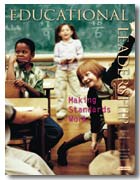In the past few issues, we asked you to tell us what you think about Educational Leadership—the articles, columns, and themes—as well as what topics interest you. Your in-the-trenches comments provide us with helpful feedback and ideas for future EL ssues. The survey was not scientific, and the results reflect only the opinions of readers who chose to participate.
We're Still the One
EL remains the magazine that readers report as the most useful for their work. One reader wrote, "Educational Leadership is the most rewarding and useful publication in the field of education." Others agreed, saying "I always find great, pertinent articles."
Readers gave high marks to the themes for our spring issues: More than three-quarters of respondents were very interested in the March theme, "Helping All Students Achieve," and 62 percent said the same of the April theme, "Beyond Class Time." And the majority of readers—nearly 80 percent—read all or most of both issues.
What You Want
Respondents agreed about what they want in EL: relevant, timely, and well-researched articles with ideas for practical application.
In March, readers identified "Grading for Success" by Carol Ann Tomlinson and "Closing the Achievement Gap" by Kati Haycock as the most interesting articles. As one reader wrote about the Tomlinson article,I continue to struggle with report card grades and what is most important for families and students to know about their learning. Thanks for news from the field.
Nearly half the respondents agreed on the most interesting article in April: "Homework for All—in Moderation" by Harris Cooper. Readers noted that homework was a crucial issue in their classrooms and a topic for debate in their school districts. One reader wrote, "The articles on homework were well-written and gave good contrasting views."
The articles on homework also sparked a heated debate among readers. "End Homework Now" by Etta Kralovec and John Buell received mixed reviews—some readers praised it for the courage to challenge the norm, whereas others criticized its findings and defended the practice of homework. One reader wrote, "Homework is a valued aspect of learning." Another reader countered, "This is an issue that needs to be addressed. Change is needed."
Among the regular EL features, survey respondents noted Research Link, Perspectives, and Web Wonders as interesting and useful. More than half the readers cited the March Research Link by John Holloway on "Inclusion and Students with Learning Disabilities," as the most useful column in the issue, and many requested more articles on inclusion in future issues.
In addition to more on inclusion, 37 percent of respondents would like to see an issue on "The Brain and Learning." Twenty-four percent are interested in "Working with Parents and the Community" and 20 percent chose "Literacy" as a topic of interest.
Your Turn
Do you agree with these survey results? Let us know what you think by completing this month's Your Turn survey on page 88 of this issue or online at www.ascd.org/elsurvey.html.
